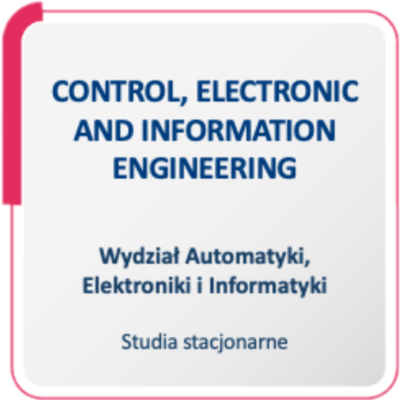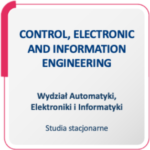- Opis
- Dodatkowe informacje
Opis
Control, electronic and information engineering
| Mode of study | Title obtained | Period of study | Language of instruction | Place of classes | Admission limit |
|---|---|---|---|---|---|
| Full-time | Master of Science (Magister inżynier) |
1,5 years / 3 semesters |
English | Gliwice | 30 |
| REKRUTACJA ZIMOWA | |||||
Faculty of Automatic Control, Electronics and Computer Science
Gliwice, 16 Akademicka St.
phone: 32 237 18 74
e-mail: air_waei_rekrutacja@polsl.pl
Control, Electronic, and Information Engineering, also called (Macrocourse CEIE), at the MSc level at the Faculty of Automation, Electronics and Computer Science, is a field of study conducted entirely in English. Students have the opportunity to choose one of three specializations at the very beginning: (1) Automatic Control, (2) Electronics and Telecommunication, or (3) Data Science, which allows the development path to be tailored to individual interests. Here you will learn how to create integrated industrial production systems, program industrial controllers, logic and microelectronic systems, design sensor networks, take care of the security of computer systems, create terrestrial network and mobile telecommunications solutions, design and verify digital systems, program in hardware description languages, use and create artificial intelligence models for data analysis or create cloud systems – depending on the specialty.
Currently, the labor market needs specialists related to the automation, electronics and IT industries. CEIE studies make it easier to obtain an interesting and well-paid job in the specialty chosen by the student. Nowadays, many works related to engineering activities, including programming, can be performed automatically, e.g. using artificial intelligence. Therefore, the labor market will be looking for employees not only who can design an electronic circuit, program a robot or write computer software, but also people who have deeper knowledge, who can analyze the operation of electronic circuits and control systems, and who understand the processes occurring in them. You will need the ability to analyze data, for example using machine learning and artificial intelligence. Studying CEIE is an opportunity to become a specialist in your chosen specialty, sought after on the labor market.
The AEI Faculty cooperates intensively with many companies from the Upper Silesian region dealing with automation, electronics and IT. Many of them have their headquarters located in the neighbourhood of the University. Although the second-cycle study program does not provide for an internship, students have the opportunity to contact employers who organize presentations or workshops at the Faculty and often participate in conducting classes.
Depending on the chosen specialization, graduates can find employment as high-class specialists in industrial automation systems, designers of advanced electronic and computer systems, data analysts or specialists in artificial intelligence and machine learning systems. Completing a MSc degree at the CEIE in the specialty of your choice is a good way to obtain an interesting and well-paid job. Graduates of the fields of study conducted at the Faculty of Automation, Electronics and Computer Science have an outstanding reputation among companies in our area, because many current employees, including managers and owners, are graduates of the Faculty.
Dodatkowe informacje
| Tytuł | magister inżynier |
|---|---|
| Stopien | Stopień II |
| Forma | Stacjonarne |
| Język | Angielski |
| Kierunek | Control, electronic and information engineering |
| Miasto | Gliwice |
| Profil | ogólnoakademicki |
| Rekrutacja | Pokaż |
| Wydział | Wydział Automatyki, Elektroniki i Informatyki |




